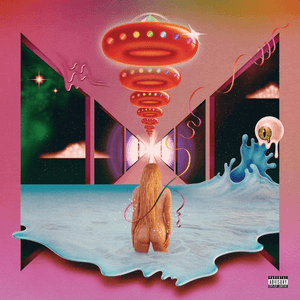STARS: 3.5/5
It’s 2017, and like many of her chart-topping counterparts of the early 2010s (Lady Gaga and Miley Cyrus come to mind), Kesha has decided to – somewhat – strip it down on her latest album “Rainbow,” and the attempt succeeds on as many fronts as it falters.
It’s been five years since Kesha’s last album, 2012’s “Warrior,” but she’s been no stranger to the spotlight. In 2014, after a two-month stay in rehab for an eating disorder, Kesha sued music producer Lukasz Sebastian Gottwald, “Dr. Luke,” for sexual, physical, verbal and emotional abuse prompting a countersuit from the producer for defamation and breach of contract.
After years of legal battles and public trauma, Kesha’s “Rainbow” serves as her long-awaited triumphant comeback record. It also serves as the first record Kesha has put out without Dr. Luke’s involvement, even though the two are still legally tied.
From the first track, “Bastards,” a bold yet simple ballad that excellently showcases her impressive vocal ability and control, it’s obvious to see that this album is Kesha’s foray into a different direction than the hip-hop tinged electronic sound that was so popular in the radio hits of the early 2010’s.
In “Bastards,” she establishes the attitude and tone of the record, a celebratory rejection of hatred in the world. She aims to be a unifying voice of peace and love for the self-conscious and insecure, erupting into an exultant chanting outro, evocative of The Beatles’ feel-good sing-a-long “Hey Jude.”
She continues this unapologetic positivity with the next few tracks, “Let ‘Em Talk,” “Woman” and “Hymn,” the first being an early 2000’s pop-punk throwback featuring rock band Eagles of Death Metal, and the following showing off a rousing collaboration with members of funk revivalist band The Dap-Kings.
First single and fifth track, “Praying,” is undoubtedly her best vocal performance to date, showing equal parts vulnerability and strength and containing the high note heard ‘round the world.
The strength of the first half of the album is lessened by two generic and unexciting pop tracks, “Learn To Let Go” and “Finding You,” which contain super-catchy choruses and forgettable verses.
In a letter Kesha penned for Refinery29 accompanying the release of the album, she shares that the title track, an uplifting piece preaching self-acceptance, was composed on a piano while she was in rehab.
She also wrote that “Rainbow’s” use of a full orchestra and its placement as the centerpiece and eighth song on the album is a nod to “God Only Knows,” The Beach Boys’ masterpiece from their trailblazing 1966 album, “Pet Sounds.” Knowing this, it’s obvious to see the influence Kesha has successfully taken from Brian Wilson’s masterwork.
Continuing the trend of bouncing between genres, Kesha returns back to her Nashville roots twice in the latter half of the album with standout tracks, “Hunt You Down” and a collaboration with Dolly Parton on a cover of Parton’s 1980 song “Old Flames (Can’t Hold A Candle to You),” originally co-written by Kesha’s mother and songwriter, Pebe Sebert.
On “Hunt You Down,” Kesha flips the typical outlaw country model on its head by singing from a feminist perspective, uttering — arguably — the best line on the album, “Baby, I love you so much. Don’t make me kill you,” proof that through all the pain Kesha has endured she has not lost her sense of humor.
The remainder of the album’s second half, save for the last track, could’ve been cut, making for a more concise and sonically focused album.
Luckily, the album ends with a blast — literally. On “Spaceship,” a psychedelic country song, Kesha asserts that she doesn’t belong in this world. In a quintessential Kesha move, she disguises something profound under a guise of fantasy. By doing this, she leaves the listener with a concise thesis for the album: “Nothing is real. Love is everything. And I know nothing.”
With this in mind, “Rainbow” serves its purpose, to reestablish a talented and hard-working artist as a legitimate musician in the vast landscape of the late 2010’s.
Though a slew of filler tracks keep the album from reaching the heights of some other indie pop greats this year, the personal and musical growth and maturity shown in the standouts prove that this is just the beginning of a new phase of Kesha’s career, and it’s looking promising so far.
Rev Ranks: Kesha’s comeback album ‘Rainbow’ an uplifting look toward future
By Bobby Crane
August 22, 2017









